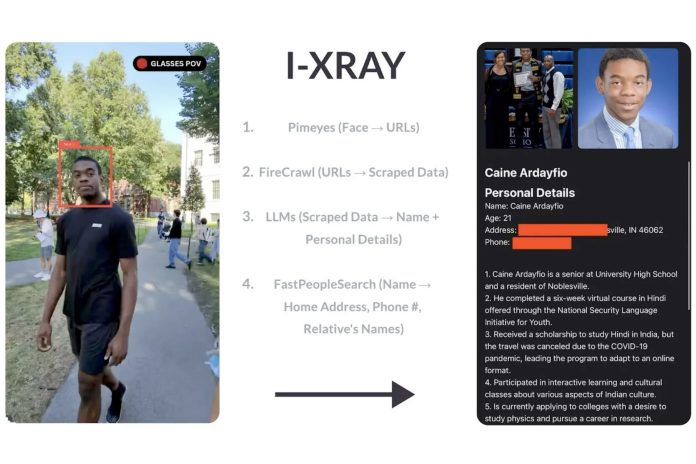A Harvard University junior, AnhPhu Nguyen, has showcased a striking demonstration of real-time facial recognition technology using $379 Meta Ray-Ban 2 smart sunglasses. By leveraging the glasses’ livestreaming feature and publicly available AI-powered facial recognition software, Nguyen was able to extract personal data on individuals he encountered in real time.
Nguyen’s setup involves connecting the smart glasses to a computer that monitors the live feed. The facial recognition software detects faces and searches the internet for additional images of those individuals. By accessing databases such as voter registration records and online articles, he gathers a wealth of personal information, including names, addresses, phone numbers, next of kin, and even social security numbers.
To efficiently compile this data, Nguyen employs a Large Language Model (LLM) similar to ChatGPT. The LLM aggregates the information into a searchable profile, which is then sent directly to his phone. Remarkably, this entire process—from capturing an image to displaying the personal data—takes only seconds.
Nguyen emphasizes that his intentions are not malicious. He explains that his goal is to raise awareness about the implications of such technology. “I wanted to highlight how easily accessible personal data can be when combined with advanced AI tools,” he says. To help individuals protect their information, he has published guidance on how to remove personal data from some of the databases he used.
Despite offering this “solution,” Nguyen acknowledges that it is a small step in addressing a much larger issue. The ease with which personal data can be accessed raises significant privacy concerns, especially as advanced AI systems become more capable. His demonstration illustrates how quickly someone can gain another person’s trust by knowing just a few personal details.
The potential risks are amplified by the activities of malicious actors. Earlier this year, in April, a significant data breach occurred when information on three billion people—including every social security number in existence—was stolen from the background check company National Public Data and posted on the Dark Web. Such incidents highlight the vulnerabilities in data security and the potential for misuse.
Nguyen has decided not to release the software he developed, which he has named I-Xray. His decision stems from concerns about how others might use the technology. “If a smart college kid has already ‘cracked the code,’ imagine what’s already happening behind the curtains,” he remarks, alluding to the possibility that similar or more advanced tools may already be in use elsewhere.
The demonstration has sparked discussions about the need for stronger privacy protections and ethical guidelines surrounding the use of facial recognition and AI technologies. As technology continues to advance, the line between convenience and privacy becomes increasingly blurred, and Nguyen’s experiment underscores the importance of public awareness and proactive measures to protect personal information in the digital age.
Source: I-XRAY (Google Doc)



